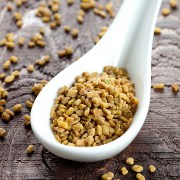Fenugreek Spice Kills Cancer Cells, but Not Normal Cells, in Lab Studies
 Photo: Getty Images
Photo: Getty Images
Fenugreek is a common component of curry powder, but if we judge by Google search results, it is better known as an herbal medicine than as a culinary spice.
Dr. Shabana Shabbeer and colleagues at Johns Hopkins University in Baltimore found that it may be an effective anticancer agent. In lab studies of breast, prostate and pancreatic cancer cell lines, fenugreek extract inhibited the growth of cancer cells but not normal cells.
“Many agents purified from dietary sources are under evaluation for their therapeutic efficacy in the treatment of cancer,” Shabbeer reported. The compound diosgenin has been previously identified as a cytotoxic agent. However, when used alone, it is not able to kill cancer cells significantly faster than normal cells. The goal of chemotherapy research is to find agents that attack cancer cells selectively.
“Our study demonstrates that FE [fenugreek extract] is selectively cytotoxic to cancer and not normal cells, while diosgenin is not capable of making such a differentiation,” Shabbeer explained. This means that the whole spice, or extracts containing all the active components, may have advantages over purified single active constituents.
Studies cited by Shabbeer showed similar results for turmeric and its primary active constituent, curcumin. These results were based on cell cultures in the laboratory, and have not been verified in clinical trials on human subjects.
The National Center for Complementary and Alternative Medicine, a service of the National Institutes of Health, reports on its web site that a few studies support the use of fenugreek to lower blood sugar in diabetic individuals. However, there is not enough evidence to support the use of fenugreek for any other health conditions.
Extracts are widely sold as dietary supplements. Side effects of these supplements may include gas, bloating, and diarrhea. Pregnant women should be aware that fenugreek has been used to induce childbirth in some traditions.
As a spice, fenugreek has been known since about 6,000 BC. Dr. Chaiti Ganguly of the Academy of Higher Learning, Greater Noida, India, reported that the Rig Veda contains the earliest records of spice use.
Fenugreek was used in traditional Indian medicine to treat bronchitis, sore throats, tuberculosis, swollen glands, skin irritations and gout. In the Middle East, fenugreek was used to treat diabetes.
I found two current clinical trials (September 18, 2011) for fenugreek listed on http://clinicaltrials.gov/. One is for its effects on blood sugar, and the other for its effect on milk production in lactating mothers.
Both Shabbeer and Ganguly recommended further research on the potential for spices to prevent or treat cancer.
References:
1. Shabbeer S et al, “Fenugreek: a naturally occurring edible spice as an anticancer agent”, Cancer Biol Ther. 2009; 8(3): 272. http://www.ncbi.nlm.nih.gov/pubmed/19197146
2. National Center for Complementary and Alternative Medicine. Fenugreek. Web. Sept. 18, 2011.
http://nccam.nih.gov/health/fenugreek
3. Ganguly C, “Flavoring agents used in Indian cooking and their anticarcinogenic properties”, Asian Pacific Journal of Cancer Prevention 2010; 11: 25. http://www.ncbi.nlm.nih.gov/pubmed/20593925
Linda Fugate is a scientist and writer in Austin, Texas. She has a Ph.D. in Physics and an M.S. in Macromolecular Science and Engineering. Her background includes academic and industrial research in materials science. She currently writes song lyrics and health articles.
Reviewed September 28, 2011
by Michele Blacksberg RN
Edited by Malu Banuelos





Add a Comment1 Comments
Dr. Fugate,
September 29, 2011 - 12:16pmThank you for this information. I came across your article when searching for pancreatic cancer on Google News. I am trying to gain attention and visibility for a Phase III clinical trial at http://www.pancreaticcancer-clinicaltrials.com in case you can offer any suggestions. I know there are people searching for options like these.
Thanks,
Jeff
This Comment